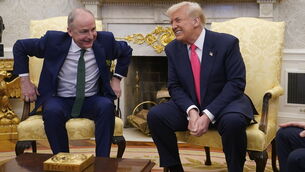They’re filthy, violent spongers who should be sent home – the Irish!
The welcome that it will get will be very different from the receptions its namesake received a century and a half ago, when a political party was formed to rid America of the Irish immigrants. In these days, when there is so much talk about repatriating refugees, it would be well to remember our own past.
It was estimated that there were around 50,000 Irish prostitutes working in New York city in 1850. They were known, in the particular Irish-American slang, as 'nymphs of the pave'.













